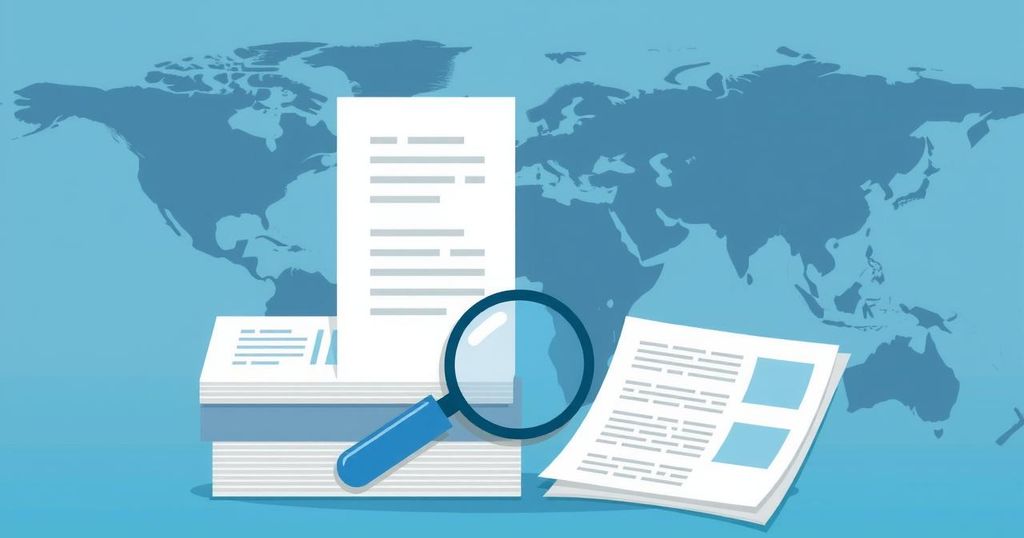Intelligence Memo Divulges Contradictions in Trump’s Claims on Tren de Aragua Gang

A declassified U.S. intelligence memo contradicts President Trump’s claims that Venezuela’s Maduro regime controls the Tren de Aragua gang. While allowing criminal activities, the regime does not direct the gang’s actions in the U.S. This revelation raises questions regarding the Trump administration’s narrative and potential media misrepresentation.
A newly declassified intelligence memo casts doubt on President Donald Trump’s assertions that the Venezuelan government controls the Tren de Aragua gang. This memo, produced by the National Intelligence Council, asserts that while the regime of Nicolás Maduro permits criminal gangs to thrive in Venezuela, it does not actively direct the activities of Tren de Aragua in the United States.
In an April 7 memo, officials stated, “While Venezuela’s permissive environment enables TDA to operate, the Maduro regime probably does not have a policy of cooperating with TDA and is not directing TDA movement to and operations in the United States.” The Office of the Director of National Intelligence released the memo after a Freedom of Information Act request from nonprofit Freedom of the Press Foundation, which then shared it with NBC News.
Trump’s rhetoric regarding Tren de Aragua has intensified, especially after he labeled the gang as an invading force under the 1798 Alien Enemies Act—an invocation rarely seen since it is typically reserved for wartime purposes. His administration has maintained that the gang operates under the Venezuelan regime’s orders. “TvA is undertaking hostile actions and conducting irregular warfare against the territory of the United States… directed, clandestine or otherwise, of the Maduro regime,” Trump stated in his earlier proclamations.
The application of this law has led to immediate deportations of Venezuelans and other immigrants to an El Salvador prison infamous for its severe conditions. The memorandum implies that the intelligence community’s position stems from evidence that shows the Venezuelan government views Tren de Aragua as a threat. They have assessed it to be more of a mixed bag of cooperation and neglect than a coordinated effort typical of how the regime interacts with other military groups.
Interestingly, a distinction was made in the memo regarding views from FBI analysts, who concurred broadly with the intelligence community’s assessments but posited that some Venezuelan officials indeed facilitate the migration of Tren de Aragua members to the U.S. They argued that these actions serve to destabilize neighboring countries such as Chile and Colombia.
The situation has prompted sharp criticism from the Trump administration, which has taken aim at media coverage, deeming it misleading. The Justice Department even pointed to this coverage as a rationale for initiating leak investigations and rolling back protections for journalists. Lauren Harper from the Freedom of the Press Foundation commented on the situation, highlighting that the memo undermines the administration’s justification for increasing scrutiny on press leaks.
“The Trump administration claimed that the leak of this memo was so dangerous… We wanted to see if that was true,” she noted. In light of the memo, she argued it illustrates how the Department of Justice’s new policies mishandle journalists’ rights.
Contrarily, the Director of National Intelligence, Tulsi Gabbard, accused the media of twisting intelligence reports about foreign criminal groups to undermine the President’s agenda regarding national safety. In a communication relayed by her spokesperson, she remarked, “Illegal immigrant criminals have raped, tortured, and murdered Americans… the propaganda media continues to operate as apologists for them.”
In March, during a House Intelligence Committee session, Gabbard acknowledged discrepancies in intelligence assessments around Tren de Aragua’s links to the Maduro regime, saying there were various opinions among intelligence community members. Secretary of State Marco Rubio, writing in an op-ed, dismissed the relevance of whether Tren de Aragua acts on Maduro’s orders, emphasizing that the regime facilitated the gang’s expansion.
Democratic lawmakers, on the other hand, have raised concerns about potential misleading claims from the Trump administration regarding the ties between Tren de Aragua and Venezuela. Congressman Joaquin Castro voiced that the facts seem to contradict the alleged connections between the gang and the Maduro government, suggesting a disconnect in the administration’s portrayal of the situation.
In summary, a declassified memo from U.S. intelligence agencies provides a clear contradiction to President Trump’s claims about the Venezuelan government controlling the Tren de Aragua gang. While the Maduro regime allows such gangs to operate, it seems they do not direct their activities in the U.S. This situation has raised questions regarding media coverage and the Trump administration’s narrative while deepening concerns among lawmakers about the administration’s portrayal of foreign threats.
Original Source: www.nbcnews.com







